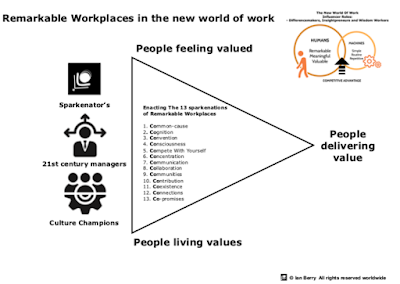Sparkenation Conversations is a format and process that I created and use personally with my clients particularly for inspiring/imagining and creating execution plans for everyday innovation in a selected focus area.
A reminder a Sparkenation is a spark that ignites passion that leads to action
that changes what’s normal.
A Sparkenation Conversation/meeting is a safe, high energy, candid and convivial dialogue about making change happen in one key focus area at a time.
Sparkenation conversations stir hearts, shift thinking and lead to small yet significant actions (quantum leaps) to take and a co-promises execution plan on a page. See the bottom of this page for an example of a plan on a page.
There are 24 essentials that are embedded in this process of Sparkenation Conversation/every day innovation meetings to ensure their success.
My favourite metaphor for the 24 is a high performance bicycle like the ones ridden by the top professionals.
The Wheels are Accountability and Appreciation.
The Seat and Handle Bars are Self-awareness and Awareness of Others.
The 5 gears are
Empathetic listening.
Noticing.
Questioning.
Silence.
Epiphanys /defining moment.
The Chain is Shared-view in the seven areas of significance.
The Spokes in the front wheel are
Being in the room.
Curiosity.
Enlightened self-interest.
Essentialism.
Gratitude.
Openness.
Relationship harmony points.
The Spokes in the back wheel are
being a Sparkenator, 21st century manager and culture champion, plus generosity.
I realise that there is a lot going on here and so I conduct regular online sessions about these 24 and the process they are contained in on a regular basis. You might bookmark my events page.
I am also available to run this session for you and those interested in your workplace as a complimentary way to introduce my work to you. Simply telephone me on +61 418 807 898 to schedule your session.
Do Your Work.
Be remarkable.
Ian















